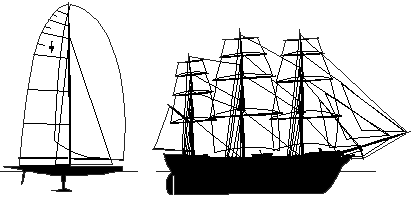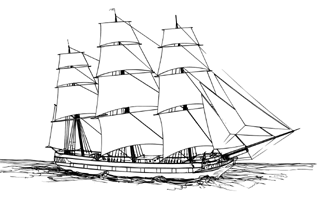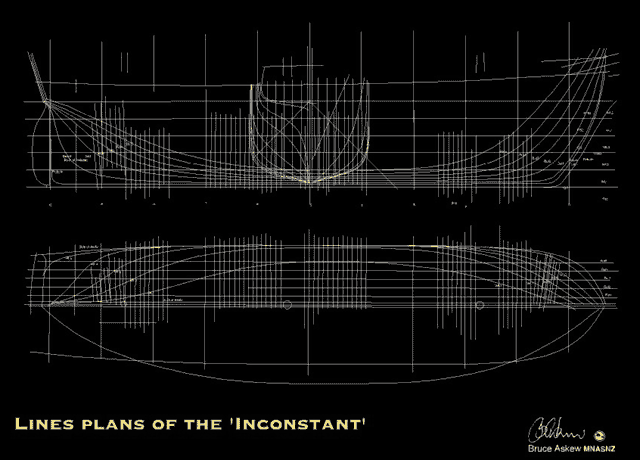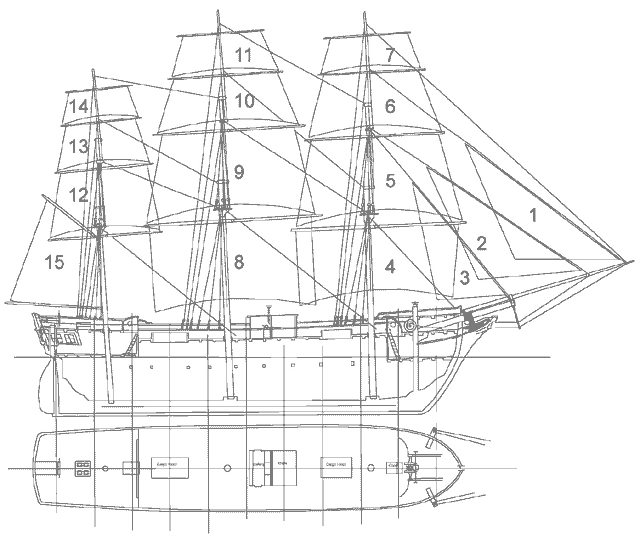| ? | ...The Inconstant was built in Canada in 1848 |
?
Not a small boat&
The Inconstant was built by George Old at the Bras D'Or shipping yards in Cape Breton, Nova Scotia [now Canada].
The Inconstant was 38 metres or 172 feet long and 8 metres or 27 feet wide and was the largest vessel ever built by Old. It was ship-rigged with three masts. The masts are estimated to have been over 30 metres or 100 feet high. It would have had about 15 sails.

(Comparison between Inconstant
and America's cup boats)
Hand crafted
The Inconstant was hand crafted from solid timbers, mainly birch, beech and spruce. Tool marks from the hand held saws, drills and other tools can be seen on the ship timbers. Some of these timbers were bent and shaped by steaming.
The ship was held together by trunnels [also known as treenails] - long wooden "nails" They did not corrode and were more flexible than metal fasteners. Some smaller nails and bolts were made of copper, which does not corrode in seawater.
The hull or underside of the Inconstant was sheathed in England with Muntz metal (an alloy of 60% copper and 40% zinc). This was to protect the underside timbers from damage from shipworm.
?
?
Design
Wooden boat design had been very slowly evolving for many centuries.
(Lines Plan of the Inconstant)
The Inconstant is little different to Cook's Endeavour despite 60 years or so age difference. The Inconstant would have used slimmer timbers higher up the hull - for economy reasons. The Inconstant's hull would have started to show more sign of hydrodynamic streamlining in the upper bow area. A quick glance would show little difference between the two boats. The Endeavour was 109 feet long and 366 tonne.
The Inconstant would probably have had black and white squares on its sides.
As a comparison, new Zealand's boats for the 2000 America's Cup defence each had 32.5 metres high mast, and 3 sails. The total area of sail for the Inconstant was probably about 967 square metres or 10,412 square feet. The ratio of the Inconstant's sails against the size and tonnage (600 tons) meant it was an efficient and fast ship.

?
|
? |
||||||
|
Estimated Rigging Detail of the Inconstant ? |
||||||
| Headsails | ? | ? | ? | Main Mast | ? | |
| 1 | Outer Jib? | 54m2 | ? | 8 | Mainsail | 116.25m2 |
| 2 | Inner Jib | 45m2 | ? | 9 | Main Topsail | 105m2 |
| 3 | Fore Topmast Staysaild | 32.5m2 | ? | 10 | Main Top Gallants | 1.75m2 |
| ? | ? | ? | 11 | Main Royal Sail | 29.75m2 | |
| Foremast | ? | ? | ? | ? | ||
| 4 | Fore Course | 97.5m2 | ? | Mizzen Mast | ? | |
| 5 | Fore Topsail | 101.25m2 | ? | 12 | Mizzen Topsail | 51.3m2 |
| 6 | Fore TopGallant Sail | 55.65m2 | ? | 13 | Mizzen Top Gallant | 27.75m2 |
| 7 | Fore Royal Sail | 25.5m2 | ? | 14 | Mizzen Royal | 16.12m2 |
| A | Main Topgallant staysail | 24m2 | ? | 15 | Spanker | 56m2 |
| B | Main top staysail | 24m2 | ? | ? | ? | ? |
| C | Main staysail | 30m2 | ? | ? | ? | ? |
| D | Mizzen staysail | 24m2 | ? | ? | ? | ? |
| ? | ? | ? | ? | ? | ? | ? |

